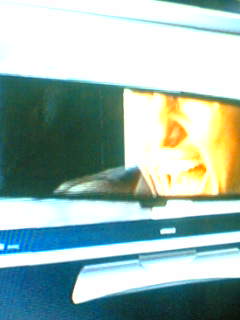|
As a cultural icon, Goldie fulfills a number of needs.
He's literally The Face of contemporary drum 'n' bass,
he's
dated Bjork, he's bigger than Grooverider, and he
helped kick-start the legendary Metalheadz label. He
also almost became
the first person, in six years of
interviewing for Zebra, that I almost hung up on.
 Given Goldie's status in the world of drum 'n' bass,
and contemporary music in general, this was always
going to
be an interview that I looked forward to and
that I researched as thoroughly as possible. Even
after I'd read the tales
scribed by journalists from
previous encounters with the man; stories etched in
conflict, an aggressive stance, and
a sense of
arrogance. Goldie, it seems, never has been an easy
man to interview and perhaps it adds to his sense of
celebrity
mystique that he's so ungiving and somewhat
confrontational in his interviews. You get the sense
when you read these
articles that he's already decided
he doesn't want to be there, that he'll be
misunderstood, and that he has little
respect for the
music journalists he's dealing with.
The cover story of Wax magazine in January 1997 asked
'Has
Goldie Lost The Plot', while Muzik that same
month carried his own declaration that "I was a car
crash waiting to happen".
These commentaries were the
outcome of his second album Saturnz Return; the
culmination of a savage critical mauling
and his
fall-out with Moving Shadow boss (and Goldie's studio
engineer) Rob Playford. The honeymoon period following
his
debut with Timeless was over, but Goldie's own
star continues to burn just as brightly. He's bigger
than Grooverider
in the eyes of the big wide world,
and it's not just because of his libido or that set of
teeth.
When the conference
call is initially connected,
Goldie does warn me. "I don't like doing interviews,"
he says down the line from London.
So when I ask him
what he's doing right now, his answer is a condensed
one that takes him all of nine seconds to recite
-
"I'm in the studio making an album right now, I'm
DJing quite a lot, and we're doing the [Metalheadz]
club on weekends"
- and when he's finished talking
you're left with the feeling that he has nothing else
to say and really doesn't really
want to be there at
all.

The working title of the new album is Sonic Terrorism.
Given that it's been two years since the release of
his
last album Saturnz Return, I think it would be
appropriate to ask Goldie what he feels are the
differences and similarities
with his previous work.
"Well, there's always going to be differences," he
snaps in an agitated manner. "I mean, what's
the
difference between Timeless and Saturnz Return . . . ?
There's always going to be a difference. I've gone
forward.
That's what I do. I'm a creative artist. I
always move forward and never do anything the same.
Things move on. It's
obviously going to be different."
I hate to read things into a tone during a telephone
conversation, but it's
apparent to me that Goldie is
annoyed by more than just the question. When I
endeavour to put it another way - what
directions he
feels he's taken with the new album - he seems a
little more giving. "It's a very grassroots direction
I'm
looking at; I don't want to adhere to anybody
else's musical direction. I'm doing what I want to do.
There's African
drums, Latin American drums, and
more." His response stops dead then and there, and I'm
left kind of stumbling over
my next question.
Throughout there's silence from his end. It's eerie.
The question goes thus: if he were to rifle
through
his record box right now, during a DJ set, what
producers would tend to crop up? "Hmmm," he finally
murmurs.
"Oh, man . . . Dillinja, myself, Lemon D, a
couple of Grooverider's mixes, Matrix, some old
classics . . . what else?
. . . different things,
man."
This man's been famous now for half a decade. When
Goldie released his debut album
Timeless in 1995 it
literally broke drum 'n' bass to the world. No other
album in jungle's chequered history had ever
had as
much impact. There was a raw, progressive element to
the album that was tied with an ethereal beauty;
rugged
breaks fused with accessible melodies. It sold
100,000 copies. Then came the sequel, Saturnz Return.
Goldie had a high-profile
falling out with
collaborator Rob Playford - "Rob lost the plot," he
tells me now - and the album itself was, in general,
ill-received
and critically mauled by the media and
audiences alike. When I ask Goldie if he felt that
Saturnz Return was misunderstood
in some ways, he's
sharp in his response.
"I don't give a fuck," he declares. "I don't give a
fuck. That's why
I do what I do and everyone else is
mauling. I don't care." He laughs.
The principle track on that album, Mother,
was
recorded with the Royal Philharmonic Orchestra. It's
an hour long and Wax magazine in the UK said it
sounded
like Pink Floyd getting raped inside a
computer. And while the track does come across as a
self-indulgent exercise,
there's an edge of
experimentation there that keeps you mesmerized if
you're prepared to give it the chance. Goldie's
said
that the track was inspired by his childhood, but is
there more to it than meets the ear? "Not really -
it's
just my life, innit? I'm doing music as honest as
I can do it."
Honesty is the issue here. The fact is that people
look
up to Goldie as a bit of an icon in the drum 'n'
bass scene, so is that a cross to bear? "I thought
they mauled me,"
the man himself quips with a knowing
sense of irony, then he laughs. "It's the way it goes.
I just enjoy myself." So
there's no pressure on him to
perform? "Nah . . ."
I caught Goldie DJing at the Metalheadz night at the
Blue
Note in London in November '98, a performance
more memorable for the records he played than his
mixing ability; Doc
Scott and J Majik, who were
playing on the same night, easily outshone him but
there was this inextricable sense of
awe when Goldie
was behind the decks. This, afterall, was the man who
delivered jungle out from the massive and into
the
hands of the masses with his album Timeless five years
ago. This is the junglist who was the first real
celebrity
'face' of drum 'n' bass, the guy who dated
Björk and bore those teeth; the former graf artist
turned cultural success
story. It's when I tell him,
towards the end of the interview, that I enjoyed his
set at the Blue Note on that occasion
that his tone
noticeably warms.
A day after our little chat the promoters ring me with
an air of damage-control.
Goldie, they tell me, was
insulted in an earlier interview and didn't want to do
anymore at all. My interview just happened
to fall
through the catch-net and I was lucky that it
happened. A couple of weeks later I find out exactly
how Goldie
was 'insulted' - some keen aficionado had
asked the man if drum 'n' bass's popularity was on the
decline. And that was
all.
I don't think Goldie's lost the plot. I think he's
just bored and indifferent. And that's a shame.
This article contributed by nobody interesting at all.
|

